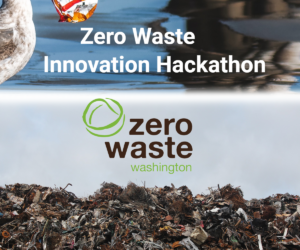Pacific NW Zero Waste Innovation Hackathon Winners
 The Buerk Center for Entrepreneurship sponsored and helped judge the first annual Pacific NW Zero Waste Innovation Hackathon on November 30, 2020. The following press release was prepared by Brian Allen and Xenia Dolovova from our partners at Zero Waste Washington with additional details about University of Washington student involvement added in. To learn more about Zero Waste Washington and the event, please click the hyperlinks for each.
The Buerk Center for Entrepreneurship sponsored and helped judge the first annual Pacific NW Zero Waste Innovation Hackathon on November 30, 2020. The following press release was prepared by Brian Allen and Xenia Dolovova from our partners at Zero Waste Washington with additional details about University of Washington student involvement added in. To learn more about Zero Waste Washington and the event, please click the hyperlinks for each.
At the first Pacific NW Zero Waste Innovation Hackathon, the three main prize winners were selected for their treatments of the inaugural theme “Making Trash Obsolete”.
The Grand Prize was awarded to Wild Nest, a team from the University of Oregon who developed an innovative plan for addressing the stunning amount of lightly used furniture waste which is generated by the hospitality sector each year. Their plan for hotel furniture decommissioning, as-is sales, re-upholstery, and designer retail earned them the judges’ top nod.
The Second Place prize went to Moment Energy from Simon Fraser University in Burnaby, British Columbia for their idea to give new life to retired electric vehicle batteries by deploying them alongside renewable energy systems as a clean energy alternative to diesel generators.
Third Place prize went to Vancouver-based Beedie Luminaries from the University of British Columbia who aim to reduce food waste one item at a time through a suite of tactics leveraging clever advances in shelf-life placards, display and stocking tactics, and a new mobile-app-based “buy one, get one later” loyalty program.
First Zero Waste Hackathon drew 15 teams from Oregon to British Columbia
The hackathon delivered a 5-week training program for student teams with business ideas relating to zero waste. Fifteen teams, including teams from the University of Washington, participated from as far south as Eugene, OR, and north to British Columbia. The students competed for cash prizes up to $2,500 while receiving mentorship, coaching, and judging from over forty-five solid waste and business professionals from around the region.
Program designed to help student entrepreneurs hit the ground running
One of Zero Waste Washington’s priorities is to promote innovation in the green and Zero Waste technology spaces, where new ideas are critically needed. A key aspect of the hackathon was the head-start it afforded participants as they prepare to compete in upcoming investor-based accelerators hosted in the winter and spring across the Pacific NW.
“Initiating the first regional dedicated to zero-waste hackathon we wanted to give an opportunity to new generation of inventors and entrepreneurs to leverage our organization’s network and knowledge base,” said Xenia Dolovova, Zero Waste Washington Program Manager.
“The Zero Waste Hackathon program has solidly placed these teams on the road to launching real-world projects that will help build a more just and sustainable world,” said Brian Allen, Zero Waste Hackathon Manager.
Student teams displayed the innovation we need for the future
There were five primary focus areas in the competition, from promoting repair and reuse, preventing food waste and revamping the recycling system, to redesigning products and reducing toxic chemicals. Participants produced five-minute videos and one-page marketing sheets, which were assessed by the judges along with a Q&A session.
“I was awed by the range of student ideas,” said Lauren Brohawn, the Assistant Director for the Alaska Airlines Environmental Innovation Challenge at the UW Foster School’s Buerk Center for Entrepreneurship, who served as a finals judge. “These ideas are almost ready to go and I am excited to see if they can move forward to investment.”
###
About Zero Waste Washington: Zero Waste Washington is 501(c)(3) non-profit organization that drives policy change in Washington State for a healthier and waste-free world. Achieving Zero Waste will play a significant role in the reduction of greenhouse gas emissions, which is essential to stopping climate change. Through its policy work, Zero Waste Washington envisions creating a more just, equitable and sustainable future for all.
